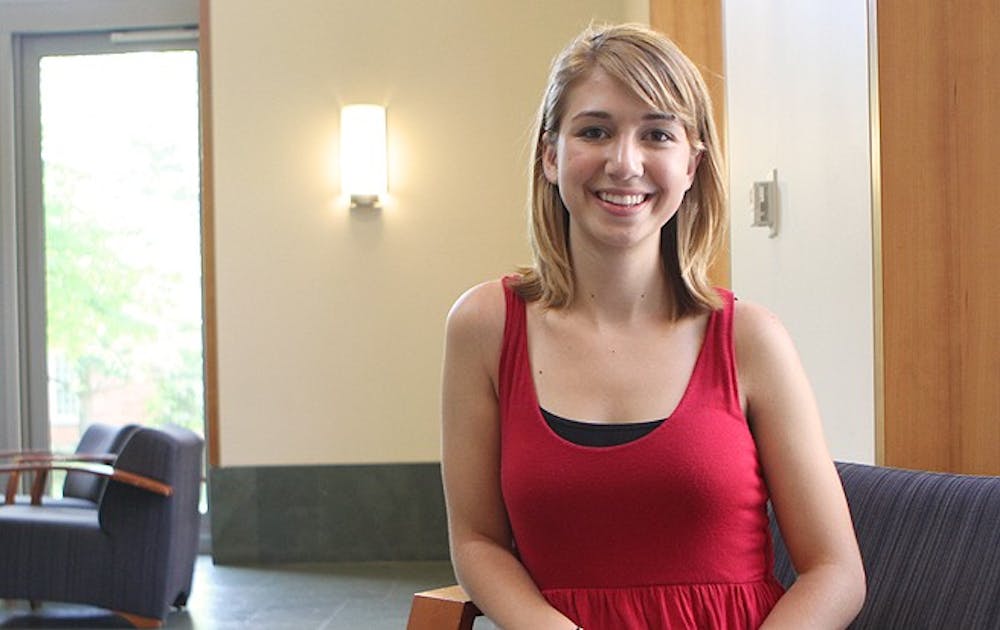This weekend, sophomore Christine Schindler will take a break from guiding tours and studying multi-variable calculus to pitch her vision for tackling global health and gender equity issues on a panel at a Clinton Global Initiative University meeting in Chicago.
At the last CGIU conference, in Washington, D.C. last March, former President Bill Clinton recognized Schindler and said her proposal to introduce engineering and global health to female high school students was especially “promising.”
“I didn’t even know [that he knew about my project] because there were over 1,000 kids there, but when I went to the opening session, he mentioned me by name and talked about my project,” she said. “It was very crazy—so surreal.”
Schindler will pilot the project, Girls Make Change Through Engineering, in the next academic year. The plan is to bring together high school students from North Carolina to work with college mentors to create medical devices. They will then send these creations to developing countries through the non-profit Engineering World Health, which provides health aid to vulnerable communities around the world.
The proposal has been generating some national buzz, with recent appearances by Schindler in Business Week and U.S. News—not to mention frequent mentions from Clinton himself.
“The reason I mention [Schindler’s] initiative is I think it has an almost infinite capacity to grow,” Clinton said in a media telephone briefing in March. “You could do it not just in engineering—you could do it in the sciences. You could do it in mathematics. You could do it in other technology-related areas. That’s what I’m hoping will happen with this commitment.”
The connection between engineering and global health makes Schindler’s program particularly appealing to the public eye, said Melissa Beard, executive director and CEO of EWH.
“With President Clinton entering the picture, the project has been upgraded to the foreground on a national level, and she could not have risen to the challenge more beautifully,” Beard said.
In Clinton’s conversations with Schindler and in press releases, he has said that if Schindler’s engineering mentorship is a success—or adopted by 30-40 universities in the nation—he will help raise funds at the annual Clinton Global Initiative meeting. This influx would bump her project to the global level.
Schindler has already been contacted by people around the world, including a woman from Kenya who has expressed her interest for the girls there to be involved.
Back home, Schindler had to grapple with the extreme minority of women going into the engineering field.
“There is such a lack of [female] engineers,” Schindler said. “It’s important because some girls are really creative but they don’t have the initial encouragement to get over the hurdle.”
The lack of an established mentoring program in her high school became apparent when applying to engineering programs as a senior, Schindler said. She decided that a college-aged role model could dispel misconceptions that have deterred many high school girls from pursuing engineering.
Her proposal highlights the connection built between the mentor and mentee, who would only be a couple of years younger than the University student.
“In high schools, [administrators] will often have professionals come in, but they are too far distant,” Schindler said. “Girls like me and my peers can give them a visual along with a tangible [product] of what their work as potential engineers could lead to.”
Beyond this project, Schindler’s experience and passions span the academic and social realms on campus. She served as a Duke Student Government senator and on the board of the Coalition for a Conflict-Free Duke, she participated in the Duke chapter of Engineering World Health and Duke Partnership for Service and she is a member of the Alpha Phi sorority and the selective living group Ubuntu.
While giving a campus tour recently, Schindler fielded a question about students’ commitment to extracurricular activities. She noted that many Duke students follow a rule of three activities outside the classroom.
She then conceded with a smile that she does not necessarily follow this rule.
Sophomore Katie West, also a member of Alpha Phi, noted that despite all of her commitments, Schindler maintains a close-knit group of friends, adding that most of Schindler’s friends found out about the success of her project only recently.
“It’s amazing that she is able to manage all that she does so well while being low-key and modest about it,” West said. “Even with everything, I know that I can always go and talk to her.”
Get The Chronicle straight to your inbox
Signup for our weekly newsletter. Cancel at any time.

